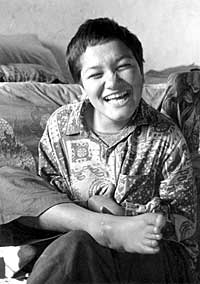 Two years back, at the age of nineteen, Jhamak Kumari Ghimire burst onto Nepal's literary scene with several collections of poems, songs, journal entries, stories and essays that showed off her remarkable mastery of language and literature, and insight into the social realities that she writes of. Born with a severe disability that has robbed her of motor control of her arms, slurred her speech, and limited her movement, Jhamak Kumari writes with her foot. Her sensibility is anything but restricted, though. With a skill that rivals that of the best progressive writers of today, she explores hard political, intellectual, feminist and social issues, without shying away from emotional expressions of love, regret, joy and sadness. The intensity of her voice is riveting: while there are, obviously, more stylish, clever poets and writers in Nepal, there may not be anyone for whom the written word carries so much urgency. Here is someone who palpably lives by her words.
Two years back, at the age of nineteen, Jhamak Kumari Ghimire burst onto Nepal's literary scene with several collections of poems, songs, journal entries, stories and essays that showed off her remarkable mastery of language and literature, and insight into the social realities that she writes of. Born with a severe disability that has robbed her of motor control of her arms, slurred her speech, and limited her movement, Jhamak Kumari writes with her foot. Her sensibility is anything but restricted, though. With a skill that rivals that of the best progressive writers of today, she explores hard political, intellectual, feminist and social issues, without shying away from emotional expressions of love, regret, joy and sadness. The intensity of her voice is riveting: while there are, obviously, more stylish, clever poets and writers in Nepal, there may not be anyone for whom the written word carries so much urgency. Here is someone who palpably lives by her words.
Both the poems translated below are excerpted from Jhamak Kumari's collected writings, Awasanpachhiko Aagaman. The first poem below speaks in controlled rage of the senselessness of the present times:
WHAT IS THE INTERPRETATION OF THE NEW MILLENNIUM?
A soft light glimmers
on the eve of people's deaths
The fern unfurls out of season
without its stem
having matured
No mourning will be observed now
on the eves of people's deaths
What is the interpretation of this age?
A separate live identity
thrives inside a scream
After a hollow ending
the raped
accused
abducted
orphaned skeletons
won't exorcise their agitation
at the crossroads of expression
as one exorcises
witches and ghosts
by sacrificing chicks
The sari and blouse torn in
the poverty of a rag to wear
in the freezing winters
dam the snow rivers of the season
and yet there is no hint of bitterness
The yearned-for attacks
not just of one winter
but of thunder and lightning
spread no mutinous luminescence
A peaceful flame burns forever
at evening time in the homes of the dead
It is likely that
the cultured people who affect devotion
do not wish to offer to the fire
a single tear
for this millennium
Now, what is the interpretation of this age?
Each hurting moment
Each hurting tremor
kisses the arrival of the new millennium
without the slightest cry of pain
Not a stir of the new millennium came
to the frostbitten heels of the old grandmother
to the ragged tunic of the old grandfather
The water jugs filled by a young girl
near this courtyard of poverty
taunt the new millennium
the flowers she has plucked and arranged
unearth countless realities
and search in the grandmother's torn sari and blouse
in the grandfather's patched tunic
for the interpretation of the new millennium
Poverty is an issue that is difficult to take on in poetry without giving way to flat, clich?-ridden didacticism. Jhamak Kumari overcomes this challenge through the sincerity of her voice, and the sophistication of her language. In the poem below, she takes to task the irresponsible father (the metaphoric father of the state) who has abandoned his progeny to the indifferent streets:
A STREET CHILD'S QUESTION TO HIS FATHER
Baba! I'll ask you a question
if you won't shout it down
for though you can boast
a hundred thousand offspring
I have only one father
Baba! Have you forgotten me
amid the hordes of your offspring
I am your fugitive child
Have you forgotten your
sleepless communion with my mother?
How could you embrace me
a new ray rising from wrong time?
I am the avenging apparition
of wrong time
an unneeded offspring
added to the hordes of your offspring
a mere child who broke through
his mother's stained womb
a renegade child
Baba! I'll ask another question
though you can boast
a hundred thousand children
the union of your blood is in
the union of my blood
Questions of silent union
arise from the cacophony
Half formed by you
fully formed by my mother
am I, the child of the street
Why did you damage me
on a corner of the street?
Why did you fill my mind
with gunpowder?
Its transformation will leave
your society and you
poisoned
Baba, my last question:
why are you siring
renegade children like me
who have lit your funeral pyre
before you have died
who have mourned you
before your death
shattering pebbles
Baba! Why are you siring
renegade children like me?
Overcoming great odds to find her clear, moral voice, Jhamak Kumari is one of the brightest points of Nepali literature today. Her stylish, clever elders in the field of poetry might learn, from her work, how to speak out for democracy and progress in these troubled times.


